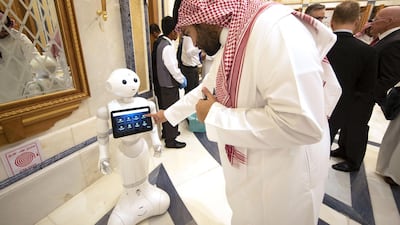The “psychological impact” of the Covid-19 outbreak on society will be severe, changing the way we live and work, the head of the world’s biggest asset management company said.
The sudden change in lives since social distancing methods were put in place to stop the spread of the virus could lead to permanent shifts in working patterns, BlackRock’s Larry Fink said.
He was speaking at an online event held by Saudi Arabia’s Future Investment Initiative Institute.
“I don’t think any company is going to go back to 100 per cent of workforce in the office," Mr Fink said.
"Whether it’s 60 per cent or 70 per cent, or in some cases maybe 50 per cent, we’re going to change the quality of life for so many of our employees by allowing them to have the option and the opportunity of working from home."
This will lead to fundamental changes for cities, which will be less congested. but there will also be less demand for commercial real estate, he said.
Cities may become less of a focal point if people can work from anywhere they choose, Mr Fink said.
BlackRock is the world’s largest asset manager, with about $6.5 trillion (Dh23.87tn) under management as of March 31.
The company made a net profit of $806 million on revenue of $3.7 billion in the first three months of the year.
But Mr Fink warned that higher inflation was likely to again become a feature of the economy, as governments globally have pumped in $8tn worth of stimulus to cushion the blow caused by the pandemic.
He also forecast a greater reliance on supply chains, and more companies moving back to their home countries as nations look to secure their own vital supplies.
The global economy is facing its worst crisis since the Great Depression of the 1930s, passing the 2008 financial crisis.
The International Monetary Fund predicts it will shrink by 3 per cent this year, a downward revision of more than 6 per cent from previous estimates made in October 2019 and January this year.
The chairman of the institute and governor of Saudi Arabia’s Public Investment Fund, Yasir Al Rumayyan, said there was still great uncertainty because “this is not a financial crisis, this is a health crisis”.
Mr Al Rumayyan praised global governments for the speed of their response.
“I think the difference between this time and the 2008 financial crisis was that we have determined what is the problem and we are trying to fix it," he said.
"We’re going to fix the core of the problem, rather than the results of it."
Australia’s former prime minister, Kevin Rudd, who was in office during the 2008 financial crisis, said the geopolitical situation now made global co-ordination more difficult,
“The key challenge is to use the capacity of the G20 to say no to any protectionist measures,” Mr Rudd said.
He said the announcement of measures that help companies to keep staff at the same time as imposing movement restrictions had been “quite critical” to limiting the damage.
“If there’s been too much of a gap in time between the announcement of lockdown of the society, and therefore the economy, and the announcement by the government of decisions to provide wage subsidies, then guess what?" Mr Rudd said.
"Employers are going to do what employers are going to do, which is to sack hundreds of thousands of people.
"Therefore, the governments that I think have handled this most effectively so far have got this sequencing question right."
He praised the IMF for its swift action in making a $1tn facility available, particularly for poorer countries, “to try and forestall any default by sovereign governments on any outstanding loans they’ve got”.
“Ensuring through the IMF and other institutional mechanisms that we are underpinning the financial stability and the economic stability of developing countries is critical not just for them, but also for global economic recovery,” Mr Rudd said.
This year’s Future Investment Initiative will take place in Riyadh on October 28 and 29.
It is set to attract more than 6,000 people from more than 110 countries.


